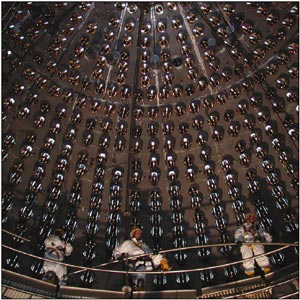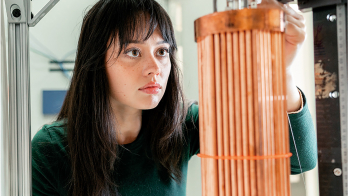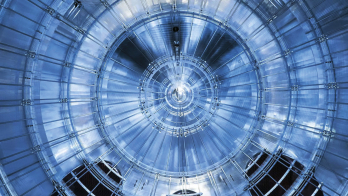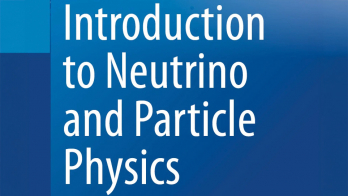The Borexino detector is now fully operational at the Laboratori Nazionali del Gran Sasso. This milestone comes after several years of technical developments that have led to the lowest background levels ever achieved, followed by construction and commissioning. In addition, problems at the underground laboratory and with local authorities – owing mainly to environmental concerns – caused four years of delay.
Borexino’s main goal is the measurement of the monoenergetic (862 keV) neutrinos from the decay of 7Be formed in a branch of the proton–proton (pp) fusion chain in the Sun. Previous experiments indicate a severe suppression of these neutrinos, which are important in understanding solar neutrinos and neutrino oscillations.

Image credit: INFN.
The experiment will detect neutrino–electron scattering in real time in its central volume of 300 tonnes of ultrapure liquid scintillator (100 tonnes of fiducial mass). This is shielded by 1000 tonnes of ultrapure quenched pseudocumene (1-2-4 trimethylbenzene) and 2400 tonnes of purified water. A stainless-steel sphere contains the pseudocumene and also supports 2200 photomultipliers to detect the light produced by neutrino interactions, while 200 phototubes facing into the shielding water provide a veto for muons.
Borexino will cast light on the low mixing-angle solution for neutrino oscillation, which is still to be confirmed at low energies, and should provide information on the electron–neutrino survival probability in the transition region (0.7–4.0 MeV) between vacuum and matter oscillations. With its very low threshold – well below 1 MeV – the experiment also has the potential to explore other solar neutrino signals for the first time, and to test the astrophysical model of the Sun at the level of a few per cent. In addition, Gran Sasso provides the ideal location for the study of geoneutrinos, thanks to the low level of backgrounds from nuclear reactors.







